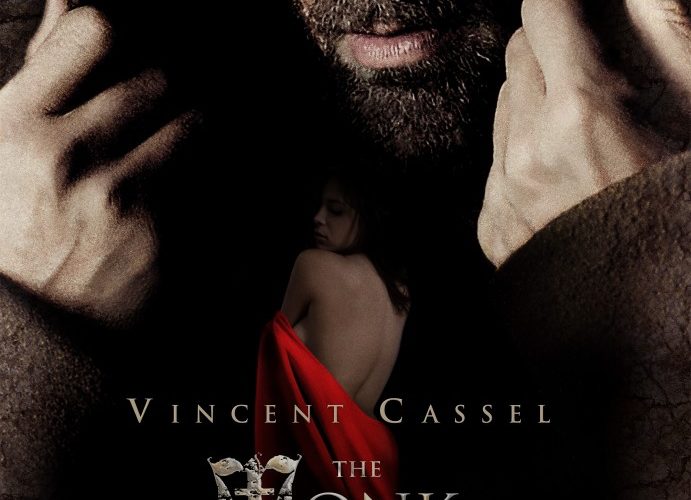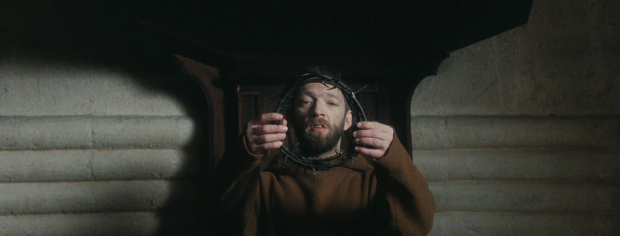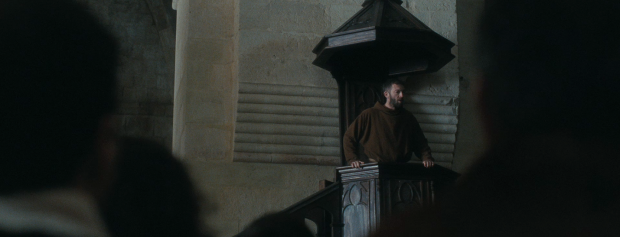Not much will go right for Ambrosio (Vincent Cassel) over the course of The Monk, Dominik Moll‘s brooding adaptation of Matthew Lewis‘s heralded 1796 novel, which, astonishingly, was written before the ill-fated author reached his twenties. The atmosphere informs us of the cruel fate that will await Ambrosio: the clouds hovering above his Capuchin monastery are as black and foreboding as the crows that once pecked away at his body when he was a newborn. Ambrosio’s likeness is often cast in deep, dark shadows, covering his face, implying an evil core that will soon be unveiled. Even when Ambrosio is preaching God’s words — belting out the sermons that have earned his so much respect amongst his peers and followers — Moll and cinematographer Patrick Blossier capture his presence from unsettlingly canted angles, suggesting that there’s something amiss and incorrect. His listeners — especially the angelic, pure-faced Antonia (Joséphine Japy) — are enamored, but we know better.
Early inklings of trouble arrive when we learn of Ambrosio’s backstory: how he was abandoned as a baby, left on the steps of this Spanish monastery, ultimately raised and tutored to become the best and brightest. One of the brothers convinced his fellow friars that the giant birthmark on Ambrosio’s shoulder was not a sign of Satan — rather, it was a sign of the act-of-God divinity of Ambrosio’s arrival. Ambrosio, too, must have believed that he was ordained by the universe in some way: he committed himself the cause, gave his life to it without considering another option, and carefully molded himself into becoming the dominant voice in a sheltered Spanish town. When a mysterious man (Sergi López) confesses to promiscuous behavior in the film’s opening scene, Ambrosio shoots down his insecurities, preaching strength and resolution in the face of Satan’s temptations. This, of course, will be Ambrosio’s own challenge later in the film.
The character’s crisis begins, quietly, with a seemingly unsolvable dream: a figure draped in red cloth, its back to Ambrosio, who looks down from the roof of a building. Ambrosio recites his dream to an elder friar who tells him that, if anybody can solve the dream, it’s Ambrosio himself, whose mind is considered superior and transcendent. Shortly after this encounter, a masked figure, Valerio (Déborah François), arrives at the monastery, begging to be taken in by the group. The gold, face-shrouding mask, says Valerio, is a remedy for burns endured during childhood. Ambrosio’s colleagues must be thrown off by this, but their skeptical reaction to Valerio’s prospects remain practical rather than emotional: the mask would inhibit the caliber of speech and presentation Ambrosio has perfected. Ambrosio himself, however, is protective of the anonymous figure from the beginning, and this earns Valerio a spot in the monastery.
This all sounds so serious and determined, and it is, but what’s kind of fantastic about Moll’s direction is that he adopts the subliminal feeling of a knowingly sleazy genre flick. The gothic-horror elements of his style, in other words, don’t attempt to dramatize the screenplay’s crude material in a sincere, straight-edge fashion — they simply strive to heighten, entertainingly, how ridiculously extreme Ambrosio’s descending-into-Hell character arc really is. As the action in The Monk becomes increasingly ghastly and macabre, so does Moll’s approach: his over-the-top superimpositions give Ambrosio’s most indefensible acts an exploitative pleasure that somehow feels refined. On top of that, there are incidents like the one where Ambrosio gets bitten by a bug that, in effect, throw the whole reality of the film into question. As The Monk reaches its conclusion, Ambrosio has simultaneously devolved into a character riddled with sin and evolved into an even-more-mythic being. It’s an absurd, goofy narrative made enjoyable by the fact that it’s filmed with so much gloomy awareness.
Vincent Cassel’s contribution here is critical, too. He embodies Ambrosio with an effectively static air, rarely changing inflection or expression to a degree that’s readily noticeable. This turns Ambrosio into a man who’s both self-confident and extremely, dangerously repressed. Some of Cassel’s recent roles — the overbearing ballet-company director in Black Swan, the sex-happy Otto Gross in A Dangerous Method — have capitalized on Cassel’s ability to excite and arouse, and that aspect of the actor’s repertoire is played with cleverly in The Monk, as Ambrosio, even at his most pious, tends to find himself surrounded by women whose youth and beauty are practically demanding him to sin on the spot. There’s a well-pitched one-on-scene between Ambrosio and Antonia — set in broad daylight, which is significant, because the film is predominately night-oriented — where Ambrosio recites some scripture to the girl, and Cassel, using every inch of his eyes, turns the holy words into an indecent come-on.
The German-born Moll, who works in French, has previously made With a Friend Like Harry… and Lemming, which features the enticing duo of Charlottes Gainsbourg and Rampling. Both were well-reviewed, though I unfortunately haven’t seen either. From what I can tell, they both had contemporary settings, which at least marks The Monk as a step in a different aesthetic direction. And Moll mounts the period with stiff, firm confidence, using blanketing shadows, blinding hallucinations, economical costuming, Alberto Iglesias‘s ominous score, and the occasional establishing shot — filled with cold, gray stone buildings that could easily be housing prisoners instead of preachers — to foster a stern atmosphere that’s not above inviting carnal satisfaction.
The Monk is currently in limited release, and is also available on VOD.



